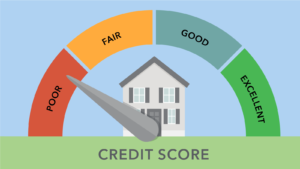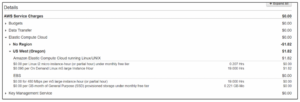To rent with medical collections and awful credit, take proactive steps to improve your credit score, such as paying off outstanding debts and establishing a positive payment history. Additionally, consider finding a co-signer with good credit or offering a larger security deposit to landlords as a way to mitigate the risk associated with your credit situation.
Being transparent about your financial challenges and providing explanations for any medical collections can also help in persuading landlords to consider your rental application. Remember, persistence and demonstrating financial responsibility can increase your chances of finding a suitable rental despite a challenging credit situation.

Credit: wamu.org
Introduction To Credit Challenges
When it comes to renting a home, having a good credit score is typically a prerequisite. However, for individuals with medical collections and awful credit, finding a rental property can be a daunting task. In this blog post, we will explore the credit challenges faced by those with medical collections and awful credit, debunk some common myths, and provide practical tips on how to navigate the rental market despite these challenges.
Impact Of Medical Collections On Credit
Medical collections can have a significant impact on an individual’s credit score. Even a single medical bill that goes unpaid can result in it being sent to collections, which can then be reported to credit bureaus. This negative mark on their credit report can lower their overall credit score, making it harder to secure a rental property.
Moreover, medical collections can stay on a credit report for up to seven years, further complicating the renting process. Landlords and property managers often view a low credit score as a potential indicator of financial irresponsibility, which may lead to a higher risk of missed rent payments.
However, it is important to note that credit scores are not the sole determining factor for rental applications. Many landlords also consider other factors such as income, employment history, and rental references. Therefore, individuals with medical collections and awful credit should not lose hope and can still find ways to present themselves as reliable tenants.
Myths About Renting With Bad Credit
There are several myths surrounding renting with bad credit that can discourage individuals with medical collections and awful credit from even attempting to apply for a rental property. Let’s debunk some of these myths:
- Myth 1: Bad credit automatically disqualifies you from renting.
While a poor credit score can make the rental process more challenging, it does not mean that you cannot find a place to rent. Landlords have varying criteria, and some may be more lenient or understanding of credit challenges. - Myth 2: You must have a co-signer with good credit.
While having a co-signer with good credit can strengthen your rental application, it is not always a requirement. Some landlords may be willing to work with you if you can demonstrate other positive attributes, such as stable employment or a higher income. - Myth 3: You can’t negotiate rental terms with bad credit.
It is possible to negotiate rental terms, even with bad credit. Offering a larger security deposit, providing rental references, or setting up automatic rent payments can help alleviate concerns and showcase your commitment to fulfilling your rental obligations.
By dispelling these myths, individuals with medical collections and awful credit can approach the rental process with a more positive mindset and explore various strategies to increase their chances of securing a rental property.
Assessing Your Credit Situation
Assessing your credit situation is a crucial step when it comes to renting with medical collections and poor credit. Before beginning the rental process, it’s important to obtain a clear understanding of your credit standing and address any potential issues that may impact your ability to secure a rental property.
Obtaining Your Credit Report
Start by obtaining a copy of your credit report from all three major credit bureaus – Equifax, Experian, and TransUnion. You are entitled to one free report from each bureau annually, which can be requested through AnnualCreditReport.com. Reviewing these reports will provide a comprehensive overview of your credit history and any outstanding debts.
Identifying Errors And Disputing Them
Thoroughly examine each credit report for any errors or inaccuracies that may be impacting your credit score. If you identify any discrepancies, it’s essential to initiate the dispute process with the respective credit bureau. This typically involves submitting a formal dispute and providing supporting documentation to rectify the errors.
Improving Credit Step-by-step
Improving your credit step-by-step is a crucial aspect of the renting process, especially if you have medical collections and a poor credit history. By implementing effective strategies and focusing on building positive credit, you can gradually improve your credit score and enhance your rental prospects.
Strategies For Paying Off Medical Debt
When tackling medical debt, it’s essential to prioritize payments and negotiate affordable payment plans with healthcare providers. Create a budget that allocates a portion of your income towards settling medical bills. Consider seeking assistance from non-profit organizations or financial counselors to navigate the process.
Building Positive Credit History
To build a positive credit history, start by obtaining a secured credit card and making timely payments. Monitor your credit report regularly to identify any errors or inaccuracies. Additionally, become an authorized user on a family member’s credit card to establish a positive credit history through their account.
Budgeting For Your Rental
Struggling with medical collections and poor credit? When renting, focus on budgeting for upfront costs like security deposits and first month’s rent. Look for landlords open to explanations about your situation and consider offering a higher security deposit to ease concerns.
Calculating Affordable Rent
Renting with medical collections and poor credit can be challenging, but it is possible to find a suitable place to live. One of the first steps in the process is calculating affordable rent. It’s important to take into account all of your monthly expenses, including bills, groceries, transportation costs, and any outstanding debts. Once you have a clear idea of your monthly expenses, you can determine how much you can realistically afford to spend on rent each month.Saving For Deposits And Fees
In addition to monthly rent, you’ll likely need to pay a security deposit and other fees upfront when renting a new place. It’s important to start saving as early as possible to ensure you have enough money to cover these costs. Consider setting up a separate savings account specifically for rental expenses and contribute to it regularly. You can also explore options like rental assistance programs or negotiating with landlords for lower upfront costs.Html
| HTML Element | Purpose |
|---|---|
| Heading for subtopics | |
| Paragraphs for content | |
| Unordered list for bullet points | |
| Ordered list for numbered points | |
| Table for presenting information | |
|
Displaying code snippets or programming instructions |
| Bolding important keywords |
Finding Rent-friendly Landlords
Looking for rent-friendly landlords? Learn how to navigate the rental process with medical collections and bad credit. Find tips on finding understanding landlords who are willing to work with your unique financial situation.
If you have medical collections or poor credit, finding a landlord who is willing to rent to you can be a challenge. However, it’s not impossible. There are some strategies you can use to increase your chances of finding rent-friendly landlords. In this article, we will discuss some of these strategies, including searching for independent landlords and looking for areas with high rental turnover.Searching For Independent Landlords
One way to increase your chances of finding a rent-friendly landlord is to look for independent landlords. These are landlords who own just one or a few rental properties and manage them on their own. Independent landlords may be more flexible than large property management companies when it comes to renting to tenants with poor credit or medical collections. Here are some tips for finding independent landlords:- Check online classifieds websites like Craigslist or Facebook Marketplace
- Look for “For Rent” signs in your desired neighborhoods
- Ask friends and family if they know of any independent landlords
Areas With High Rental Turnover
Another strategy to consider is looking for areas with high rental turnover. These are neighborhoods where rental properties are in high demand, and landlords are more likely to have vacancies they need to fill quickly. In these areas, landlords may be more willing to overlook poor credit or medical collections if they need to fill a vacancy quickly. Here are some tips for finding areas with high rental turnover:- Look for neighborhoods with a high concentration of rental properties
- Check online rental listings to see which areas have a high number of vacancies
- Ask property managers which areas have the highest demand for rental properties
Showcasing Your Reliability
Renting with medical collections and poor credit can be challenging, but showcasing your reliability can help. Provide references from previous landlords, show proof of steady income, and consider a co-signer to increase your chances of securing a rental.
Gathering Strong References
When renting with medical collections and awful credit, showcasing your reliability is essential. One effective way to do this is by gathering strong references from credible sources. These references can vouch for your character and ability to fulfill your rental obligations. Here are some tips on how to gather strong references:
- Reach out to previous landlords or property managers who can speak positively about your rental history and reliability.
- Ask for references from reputable professionals, such as employers, supervisors, or colleagues, who can attest to your responsible behavior and financial stability.
- Consider seeking references from personal acquaintances, such as friends, family members, or mentors, who can provide insight into your character and reliability.
- Ensure that the references you gather are willing to vouch for you and provide their contact information to potential landlords.
By gathering strong references, you can demonstrate to landlords that despite your medical collections and poor credit, you have a track record of being a reliable tenant.
Demonstrating Stable Income
Another crucial aspect of showcasing your reliability when renting with medical collections and awful credit is demonstrating stable income. Landlords want assurance that you will be able to pay your rent consistently and on time. Here are some ways to demonstrate stable income:
- Show proof of steady employment by providing recent pay stubs or an employment verification letter.
- If you are self-employed, provide tax returns or financial statements that highlight your consistent income.
- Consider offering to pay a larger security deposit or provide a co-signer who has stable income to further reassure landlords.
- Be prepared to explain any financial challenges you may have faced in the past and how you have taken steps to overcome them.
By demonstrating stable income, you can alleviate concerns landlords may have about your ability to meet your financial obligations, despite your medical collections and poor credit.
Alternative Qualifying Criteria
When facing challenges with medical collections and poor credit, alternative qualifying criteria can help secure a rental. These strategies offer options beyond traditional credit checks.
Using A Co-signer
A co-signer with good credit can bolster the application and provide assurance to the landlord.
Offering Larger Deposits
Increasing the deposit amount can mitigate the risk for the landlord, making them more inclined to approve the application.
Legal Considerations And Rights
When renting with medical collections and bad credit, it’s crucial to understand your legal considerations and rights.
Understanding Renters’ Rights
- Research local renters’ rights laws
- Ensure fair treatment and equal opportunities
Avoiding Discrimination
- Know your rights under the Fair Housing Act
- Report any discriminatory practices immediately
Negotiating Rental Terms
When negotiating rental terms, it’s crucial to communicate openly and be flexible.
Communicating With Potential Landlords
- Be honest about your situation
- Explain any medical collections or credit issues
- Provide references or proof of steady income
Flexibility In Lease Agreements
- Request a shorter lease term
- Offer a larger security deposit
- Propose automatic rent payments

Credit: www.sandiegouniontribune.com
Moving Forward With Confidence
When faced with medical collections and poor credit, renting a home may seem daunting. However, by taking proactive steps and maintaining good renting practices, you can secure a rental with confidence.
Maintaining Good Renting Practices
- Pay rent on time to build a positive rental history.
- Communicate with landlords about any financial challenges.
- Keep the rental property well-maintained.
Continuing Credit Improvement
- Monitor your credit report regularly for accuracy.
- Dispute any errors on your credit report promptly.
- Reduce outstanding debts to improve your credit score.

Credit: www.gpb.org
Frequently Asked Questions
Can I Be Denied An Apartment Because Of Collections?
Yes, it is possible to be denied an apartment because of collections. Landlords often check credit reports and collections can indicate a history of late payments or financial instability. However, each landlord has their own criteria for accepting tenants, so it is not a guarantee.
It is important to be upfront about any financial issues and provide explanations or proof of resolution.
Can Paid Medical Collections Be Removed From Credit?
Yes, paid medical collections can be removed from credit reports. It’s advisable to negotiate with the collection agency and ask for a “pay for delete” agreement. Once paid, you can request removal from your credit report. Regularly check your report to ensure it’s been updated.
Can You Get An Apartment With A Credit Score Of 500?
Yes, it is possible to get an apartment with a credit score of 500. However, it may be more challenging as a lower credit score can affect your ability to qualify for certain rentals. It’s important to be prepared to provide additional documentation or a higher security deposit to increase your chances of being approved.
Can You Get An Apartment With A Derogatory Mark?
Yes, it’s possible to rent an apartment with a derogatory mark, but it may be challenging.
Conclusion
Renting with medical collections and poor credit is challenging, but not impossible. By understanding your credit report, negotiating with landlords, and being proactive, you can increase your chances of finding a suitable rental. Remember to prioritize open communication and honesty throughout the process to build trust with potential landlords.
With determination and strategic planning, you can secure a rental despite financial setbacks.






